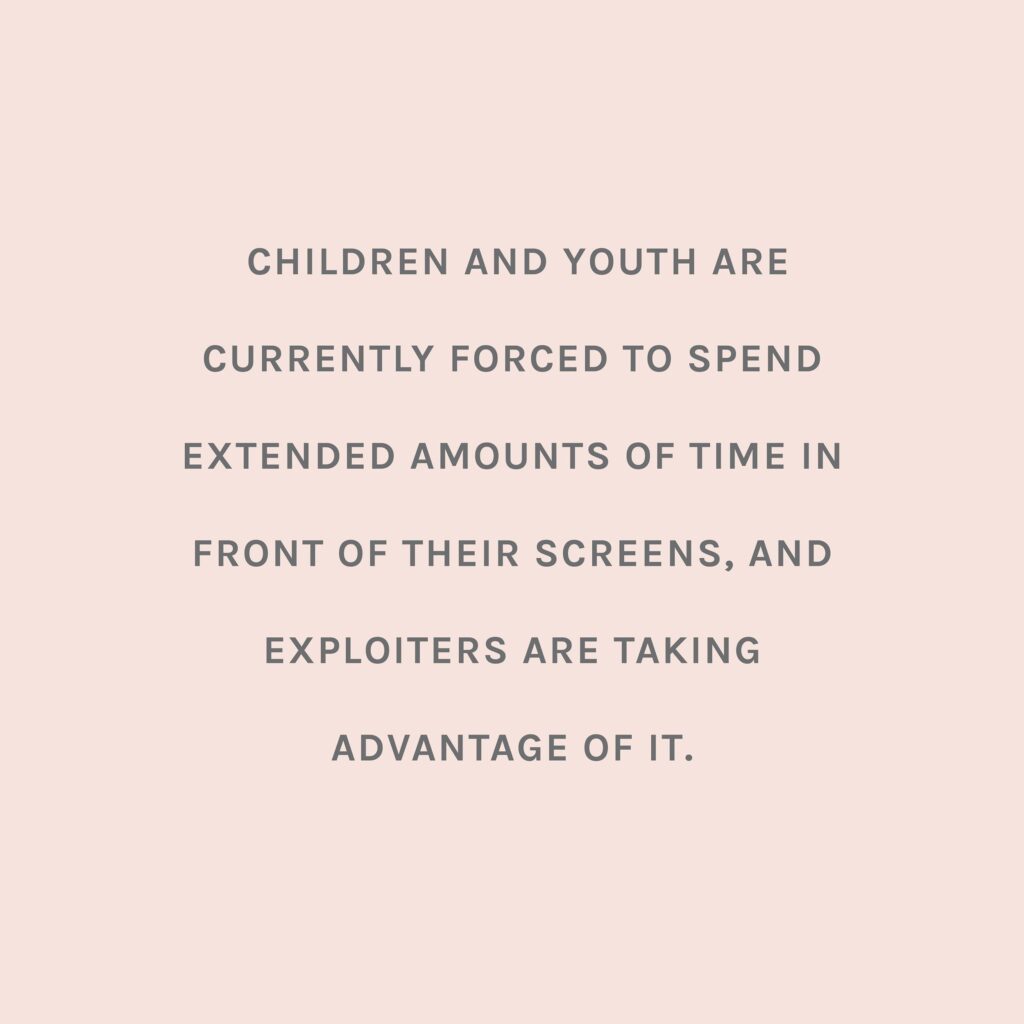Happy Wednesday everyone! I am so honoured to welcome the Children of the Street team to the blog, to share some more resourceful content with you. If you missed their first post, Camila from their team shared some content from their “It can happen to anyone” program about Sexual Exploitation, make sure to check it out here. Today, Courtney from their “Safer Space” program is taking over and sharing how we can keep our kids safe online and protected from online exploiters and sextortion.
Take it away, Courtney!
Navigating the digital world as a parent or caregiver can feel overwhelming – especially today as we try to navigate our work, school, and social schedules online. Children and youth are currently forced to spend extended amounts of time in front of their screens, and exploiters are taking advantage of it. Cybertip.ca has reported an 88% increase in reports of online child sexual exploitation, since the beginning of the pandemic. We are also seeing increased cases of sextortion (threats to expose a sexual image to make a person do something) happening among youth ages 10-18.
I’ll take you through an example:
Let’s say, your child has an online “friend” on their online game, and each day after school this friend shares cheat codes (or admin codes) for the game with your child. Your child now trusts their online “friend” and no longer sees them as a stranger. One day this “friend” tells your child, “Today, if you want your code, all you have to do is send me a picture of yourself in your bathing suit”. And your child thinks, I can trust my friend, they’ve always been reliable before… what’s the harm in sending them a picture? So, they send one. Now, their online friend is threatening to share this intimate image if your child doesn’t send more. That’s sextortion.
Another common way that young people are being exploited is by their peers. Young people are sharing intimate images with friends and partners for several reasons: to flirt, for validation, for social acceptance. According to the Journal of the American Medical Association, 12-16% of teens and preteens have sent a nude image to someone. Unfortunately, these youth are not thinking about the potential negative consequences of sharing their image. But the fact of the matter is, once these images leave their phones, there is no way to control what happens to them.
It’s up to us, as the parents and caregivers, to equip our children with the tools they need to stay safe online. We would never hand over a car to our 16-year-old before having them pass their written drivers test, taking them out for practice drives, and having some serious talks about consequences if the car is not used safely. It should be the same when giving our children their first cell phone or online device.
Before we hand over that device, we need to have a conversation about our expectations regarding time usage, seeking permission before downloading apps, and reassuring our kids that they can always come to us for help. Another important thing to discuss is the potential consequences for not meeting those expectations. When we involve our youth in these conversations, they know what is coming down the line if they make a poor choice and can hold themselves accountable.
Many young people don’t report online harassment because they are afraid that their device or screen time will be taken away. If we can eliminate these fears by choosing appropriate consequences together, we may be saving our children from feeling isolated and alone when something goes wrong.
Ultimately, the best defense against the dangers of the online world, is having a strong relationship with your child – a relationship built on trust and open communication. When a child knows that they can trust the adults in their lives they are more likely to reach out for help when it is needed. We also need to trust that our kids will do their very best to make responsible choices online and acknowledge that, at the end of the day, they are just kids and kids will make mistakes.
For more information about keeping kids safe online, or to book a workshop for your school, workplace or community group, contact Courtney Liem at Children of the Street at [email protected].
Until next time!




